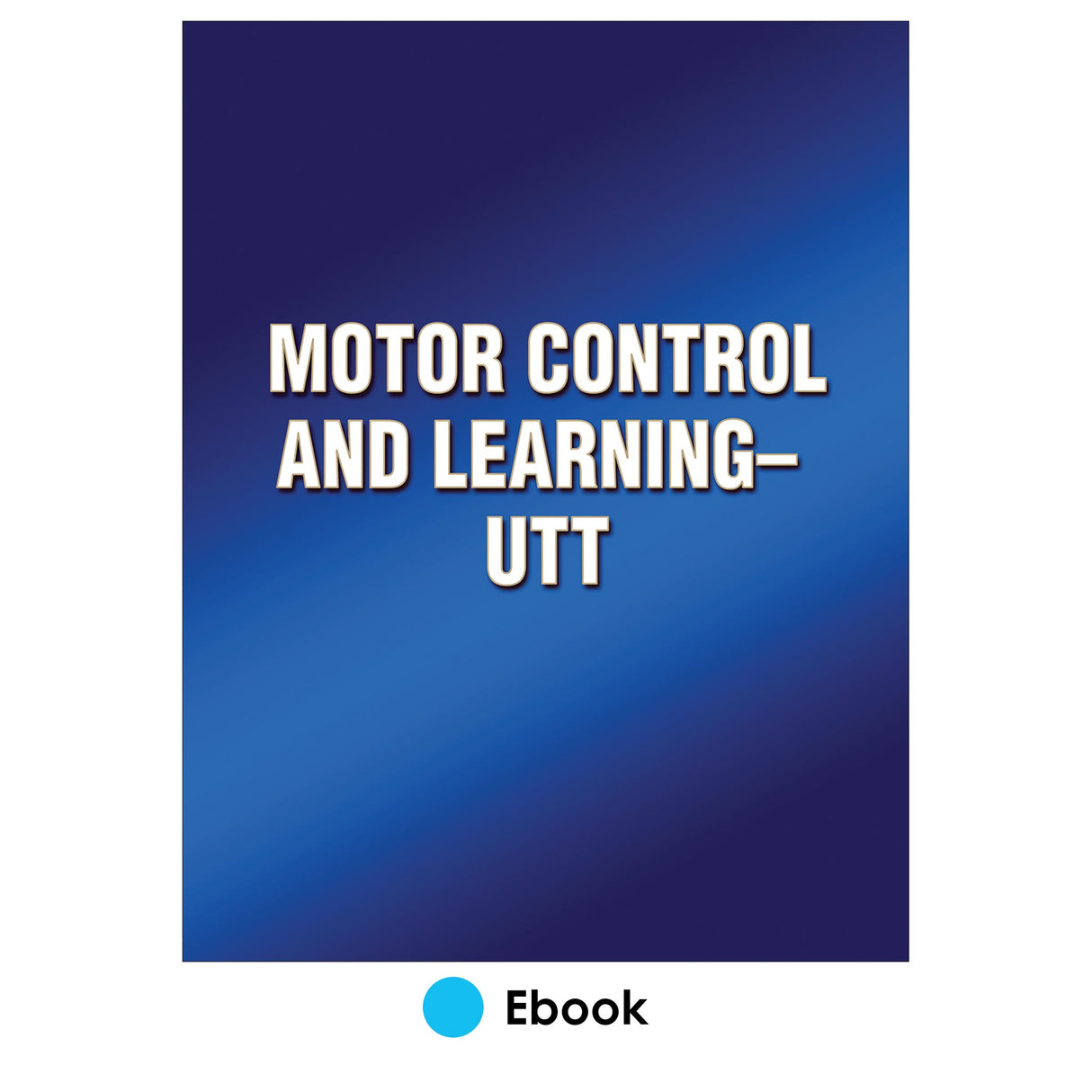This custom ebook includes chapters from Neurophysiological Basis of Motor Control, Third Edition, and Motor Learning and Performance, Sixth Edition. It has been specifically designed for students taking the course Motor Control and Learning (KIN 3331) at University of Texas at Tyler (UTT).
Audience
Custom ebook for students taking the course Motor Control and Learning (KIN 3331) at University of Texas at Tyler (UTT).
Processing Information and Making Decisions
From Motor Learning and Performance, Sixth Edition
Attention and Performance
From Motor Learning and Performance, Sixth Edition
Motor Programs
From Motor Learning and Performance, Sixth Edition
Principles of Speed, Accuracy, and Timing
From Motor Learning and Performance, Sixth Edition
Skeletal Muscle
From Neurophysiological Basis of Motor Control, Third Edition
Peripheral Receptors
From Neurophysiological Basis of Motor Control, Third Edition
Motor Units and Electromyography
From Neurophysiological Basis of Motor Control, Third Edition
Cerebral Cortex
From Neurophysiological Basis of Motor Control, Third Edition
Basal Ganglia
From Neurophysiological Basis of Motor Control, Third Edition
Excitation and Inhibition Within the Spinal Cord
From Neurophysiological Basis of Motor Control, Third Edition
Monosynaptic Reflexes
From Neurophysiological Basis of Motor Control, Third Edition
Mark L. Latash, PhD, is a distinguished professor of kinesiology and the director of the Motor Control Laboratory at Penn State University. His research interests are the control and coordination of human voluntary movements, movement disorders in neurological patients, and effects of rehabilitation.
Latash has authored five books, edited 10 books, and had more than 400 peer-reviewed articles published. He was the founding editor of the journal Motor Control and is a former president of the International Society of Motor Control (ISMC). He is a fellow of the National Academy of Kinesiology (NAK) and member of the Society for Neuroscience (SfN). He has served as director of the annual Motor Control Summer School series and is a recipient of the ISMC’s Bernstein Prize in motor control and Penn State’s Pauline Schmitt Russell Distinguished Research Career Award.
Tarkeshwar Singh, PhD, is an assistant professor of kinesiology at Penn State University, where he serves as the director of the Sensorimotor Neuroscience and Learning Laboratory. Singh’s research interests are in the areas of multisensory integration, motor control, eye movements, and movement disorders. He has published over 30 peer-reviewed papers and three book chapters. He is a member of the Society for Neuroscience (SfN), the International Society of Motor Control (ISMC), the Society for the Neural Control of Movement (NCM), and the American Physiological Society (APS).
Richard A. Schmidt, PhD (1941–2015) was a professor emeritus in the department of psychology at UCLA. At the time of his death, Schmidt ran his own business, Human Performance Research, conducting research and consulting in the area of human factors and human performance. Widely acknowledged as one of the leaders in research on motor behavior, he had more than 40 years of experience in the area of motor learning and performance.
The originator of both schema theory and impulse-variability theory (aka “Schmidt’s Law”), he founded the Journal of Motor Behavior in 1969 and was editor for 11 years. He authored the first edition of Motor Control and Learning in 1982 and the first edition of Motor Learning and Performance in 1991.
Schmidt was highly recognized for his contribution of a lifetime of research and writing. In recognition of his work, he received honorary doctorates from the Catholic University of Leuven in Belgium (in 1992) and the Université Joseph Fourier in France (in 1998). He was a longtime member of the North American Society for the Psychology of Sport and Physical Activity (NASPSPA), where he served as president in 1982 and received the organization’s two highest honors: the Distinguished Scholar Award for lifetime contributions to research in motor control and learning (in 1992) and the President’s Award for significant contributions to the development and growth of NASPSPA (in 2013). He was also a member of the Human Factors and Ergonomics Society and the Psychonomic Society and received the C.H. McCloy Research Lectureship from the American Alliance for Health, Physical Education, Recreation and Dance. His leisure-time passions included sailboat and Porsche racing.
Timothy D. Lee, PhD, is a professor emeritus in the department of kinesiology at McMaster University in Hamilton, Ontario. He has published extensively in motor behavior and psychology journals since 1980, served as an editor for the Journal of Motor Behavior and Research Quarterly for Exercise and Sport, and has been an editorial board member for Psychological Review. Until his retirement in 2014, his research was supported primarily by grants from the Natural Sciences and Engineering Research Council of Canada.
Tim has been a member, secretary-treasurer, and president of the Canadian Society for Psychomotor Learning and Sport Psychology (SCAPPS) and a member of the North American Society for the Psychology of Sport and Physical Activity (NASPSPA), the Psychonomic Society, and the Human Factors and Ergonomics Society. In 1980 Tim received the inaugural Young Scientist Award from SCAPPS, and in 2011 he was named a fellow of the society—its highest honor. He was named an international fellow by the National Academy of Kinesiology in 1999 and awarded the Distinguished Scholar Award by NASPSPA in 2017.
Tim is an avid golfer who competes in local, national, and international tournaments. He teamed with a good friend, Frank Morris, to win the Ontario Senior Better Ball Championship in 2017.





